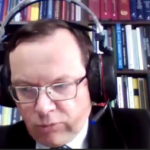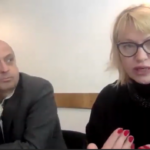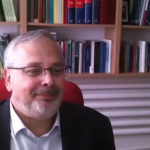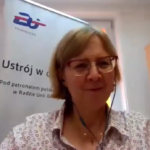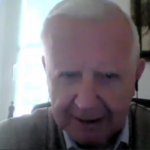Poland’s Membership in the European Union – Systemic Changes and Legal Challenges/Democratization through Convergence: the EU Factor in the Socio-Political Development of Ukraine
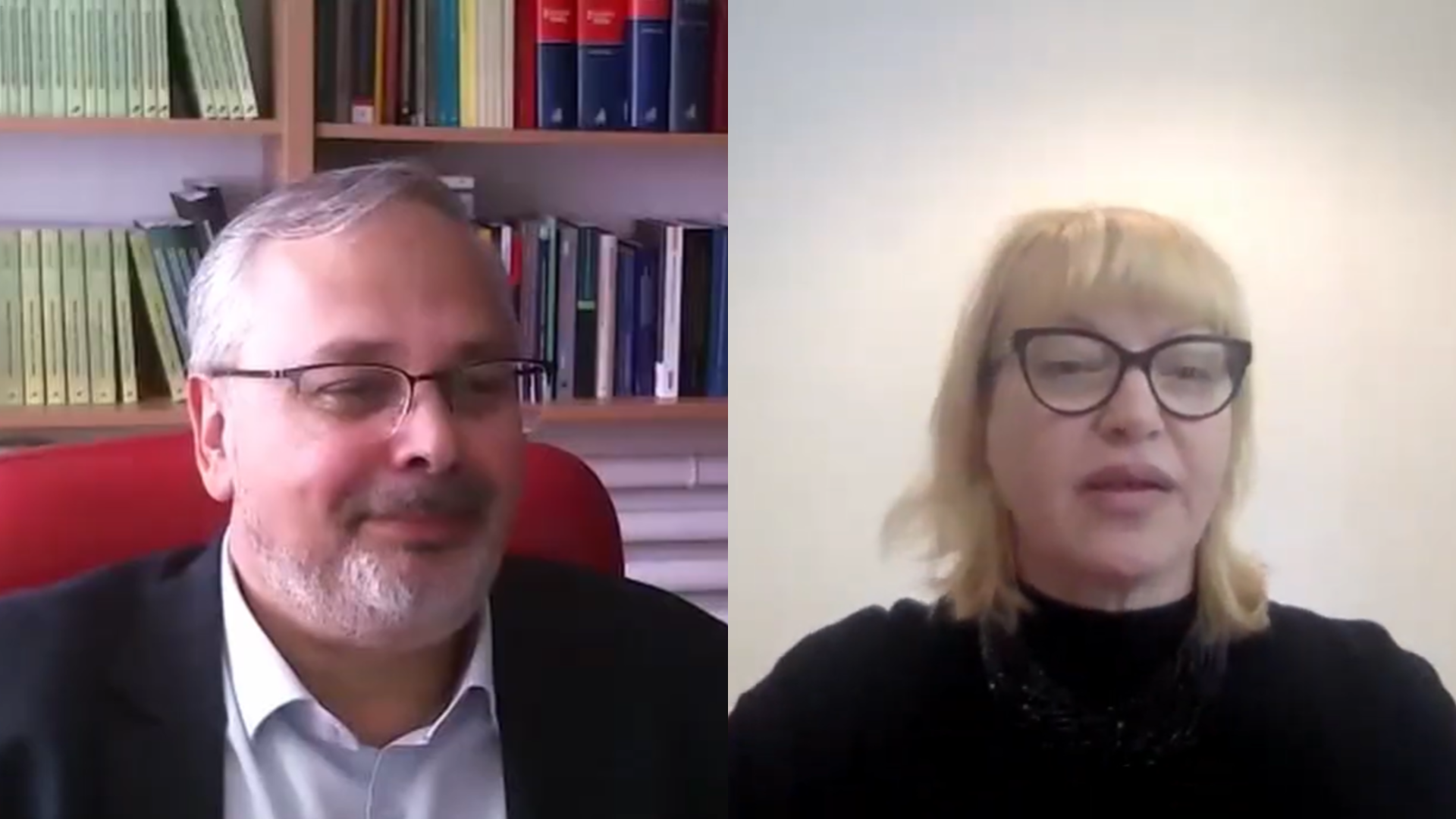
15 05 2025
We have completed the third seminar in the series “The System in Action”, and at the same time the first one where two parallel papers were presented—Polish and Ukrainian. Dr. habil. Ryszard Balicki, professor at the University of Wrocław, delivered a paper entitled “Poland’s Membership in the European Union – Systemic Changes and Legal Challenges”. The second paper, titled “Democratization through Convergence: the EU Factor in Ukraine’s Socio-Political Development”, was presented by Prof. Galyna Zelenko from the National Academy of Sciences of Ukraine in Kyiv. Both papers dealt with the issue of European integration, though in different contexts. Given the importance of the subject, the event was held under the patronage of the Polish Presidency of the Council of the European Union.
Prof. Balicki emphasized that Poland’s accession was not only a political decision but also a deep systemic and social transformation. He also highlighted often underestimated accompanying activities—such as preparing the society and building dialogue with citizens to reduce Euroscepticism—emphasizing that in Poland’s case, the decision to join the EU was made by the sovereign itself through a nationwide referendum.
The speaker recalled the requirements Poland had to meet as a candidate country, especially the necessity of adapting Polish law to EU law. This entailed deep changes. The integration of these two legal systems was made possible by norms concerning the observance of international law enshrined in the Polish Constitution, and a pro-integration interpretation of domestic law, which also established the limits of this practice—namely, the primacy of the Polish Constitution and the preservation of constitutional identity. Against this background, Prof. Balicki pointed out the challenges of combining the principle of national sovereignty with the principle of the primacy of EU law and loyal cooperation.
He then discussed the long and extremely complex integration process (1998–2002), which included broad institutional reforms related to adapting national law to EU law, an accession referendum preceded by a campaign preparing society for membership, and the adoption of the concept of shared sovereignty instead of absolute sovereignty, according to which the EU constitutes an integral element of Poland’s constitutional order.
According to Prof. Balicki, three articles of the Polish Constitution paved the way for integration: Article 9 (a general obligation to observe binding international law), Article 90 (described by the speaker as the constitutional pillar of European integration, due to the compromise concerning the transfer of some public authority competencies to international bodies with parliamentary consent), and Article 91 (direct applicability and primacy of international agreements after ratification and publication, thus defining the place of international law in the national legal order). Importantly, during the accession process, a key debate emerged around Article 90, concerning the limits of transferring competencies to international bodies, procedures for constitutional review of international agreements, and the protection of constitutional identity (a set of fundamental systemic values enshrined in the constitution).
In this context, Prof. Balicki presented the conclusion that Poland adheres to a dualistic-cooperative model of the relationship between national and EU law. He argued this using the accepted concept of shared sovereignty and legal pluralism, as well as the legal limits of integration (the primacy of the Constitution in the event of an irresolvable conflict between Polish and EU law). However, the speaker emphasized a hierarchical reservation embedded in the model of constitutional pluralism, derived from the doctrine of conditional acceptance of EU law. Thus, at the core of this model lies, on one hand, the principle of the primacy of EU law, and on the other—the assumption of coexistence and autonomy of the Polish and EU legal systems. Consequently, the final assessment of the compliance of applicable law in Poland remains in the hands of the Constitutional Tribunal, which, however, is still required to respect the principle of loyal cooperation. The speaker also noted possible dangers resulting from rulings of non-compliance, including, in extreme cases, the possibility of Poland leaving the EU.
After expanding on the topic of European integration, Prof. Balicki addressed the aforementioned principle of loyal cooperation—as a foundation for the duty of cooperation between Poland and the EU in fulfilling the Treaties’ objectives. On one hand, it imposes on member states the imperative to act in good faith towards the fastest, most effective, and most correct implementation of EU directives; on the other, it requires the EU to respect member states’ laws. According to the speaker, tensions observed in recent years—marked by the “deformation” of the judiciary—have emerged against this backdrop, manifesting as a broader rule-of-law conflict in the context of the dispute between the CJEU and the Polish Constitutional Tribunal regarding the judiciary. Hence, a breach of the principle of loyal cooperation may lead to normative chaos.
At the end, Prof. Balicki offered a general assessment of Poland’s EU integration process, which proceeded without significant constitutional changes thanks to the Constitution’s flexibility—although there were proposals to add a “European chapter” to the Constitution. In his opinion, the overall evaluation of Poland’s two decades in the EU is positive (e.g. harmonization of national and EU law, economic development), despite challenges accompanying the integration process (e.g. limitation of sovereignty) and various social effects (e.g. improved quality of life, cultural tensions). Prof. Balicki pointed out lessons that candidate countries can draw from Poland’s experience in systemic and economic transformation. These include: early and consistent institutional preparation, transparency of the integration process with citizen participation, coherent migration policy, building economic competitiveness, and protection of constitutional identity.
The paper sparked a lively discussion on, among others, the legacy of communism, attitudes towards continued EU membership, problems surrounding accession negotiations and their broader dynamics, constitutional identity, Constitutional Tribunal jurisprudence, the right of veto in voting, and the concept of a multi-speed Europe.
In light of the above, Prof. Balicki presented the conclusion that a dualistic-cooperative model of the relationship between domestic and EU law operates in Poland. He supported this with reference to the adopted concept of shared sovereignty and legal pluralism, as well as the legal limits of integration (the primacy of the Polish Constitution in cases of irreconcilable conflict between Polish and EU law). However, the speaker emphasized a hierarchical reservation embedded in the model of constitutional pluralism, stemming from the doctrine of conditional acceptance of EU law. At the foundation of this model lies, on the one hand, the principle of the primacy of EU law, and on the other—the assumption of coexistence and autonomy of the Polish and EU legal systems. As a result, the final assessment of the compliance of binding law in Poland remains in the hands of the Constitutional Tribunal, which is still expected to respect the principle of loyal cooperation. The speaker also highlighted the potential dangers associated with rulings of non-compliance, including the extreme possibility of withdrawal from the EU.
Following the elaboration of the issue of European integration, Prof. Balicki addressed the aforementioned principle of loyal cooperation—the basis for the obligation of cooperation between Poland and the EU in achieving the objectives of the treaties. This principle, on one hand, imposes on member states the imperative to act in good faith to ensure the fastest, most effective, and most accurate implementation of EU directives; on the other, it requires the EU to respect member states’ laws. According to the speaker, it is within this context that tensions have arisen in recent years—marked by the “deformation” of the judiciary—manifesting as a broader conflict over the rule of law, embedded in the context of the dispute between the CJEU and the Polish Constitutional Tribunal over the judiciary. Thus, a violation of the principle of loyal cooperation can lead to the emergence of normative chaos.
In conclusion, Prof. Balicki offered an overall assessment of Poland’s EU integration process, which proceeded without significant constitutional amendments due to the Constitution’s flexibility—although there were proposals to add a “European chapter” to the Constitution. According to the speaker, the overall assessment of two decades of Poland’s EU membership is positive (e.g. harmonization of national and European law, economic development), despite the challenges accompanying the integration process (e.g. limitations on sovereignty) and the varied social effects (e.g. improved quality of life, cultural tensions). Prof. Balicki pointed to the lessons that candidate countries can learn from Poland’s experience in systemic and economic transformation. These include: early and consistent institutional preparation, transparency of the integration process with the participation of citizens, a coherent migration policy, building economic competitiveness, and the protection of constitutional identity.
The presentation sparked a lively discussion, including on the legacy of communism, public sentiment regarding continued EU membership, issues accompanying accession negotiations and their broader dynamics, states’ constitutional identity, rulings of the Constitutional Tribunal, veto rights in voting, and the concept of a “multi-speed Europe”.
The second presentation, delivered by Prof. Galyna Zelenko, began with outlining the conditions of Ukraine’s democratic transformation, which, according to the speaker, have been and continue to be primarily influenced by exogenous factors related to its geopolitical position between Russia and the EU—both of which draw other countries into their spheres of influence. To provide a theoretical framework for her remarks, the speaker referred to several approaches to democratization: convergence, intervention, internationalization, and diffusion, while emphasizing the importance of targeted influence on regimes in the transformation process (e.g. through international aid). The first concept is based on the thesis that systems tend more toward convergence than differentiation, which accompanies the process of integrating a non-democratic state into the community of democratic states. In turn, the theory of diffusion explains the extent to which non-democratic societies are susceptible to adopting democratic norms depending on native culture and the influence exerted by democratic states.
Thus, in democratization processes, the autocratic-democratic character of a country’s environment plays a significant role.
The speaker compared the process of European integration to a system of spheres—with Russia on one side and the European Union on the other, and in between, smaller countries that must understand who they are truly playing with. In her view, Ukraine has traveled a long path from uncertainty and post-Soviet influence to a clearly pro-European course.
Prof. Zelenko then went on to discuss the impact of Europeanization on the institutional capacity of countries formerly associated with the USSR to adapt to EU norms and practices. According to the speaker, a key element in this context is the development of tools tailored to a specific country, rather than directly importing ready-made versions. In order for countries to apply for EU membership, they must meet the following criteria: respect for representative democracy and human rights, the Copenhagen criteria (e.g. stability of democratic institutions), and the principle of good neighborliness (willingness to cooperate). However, the speaker also emphasized that in addition to the requirements placed on candidate countries, the EU also offers them support in the form of so-called soft power related to economic reforms in those countries.
Prof. Zelenko next presented arguments supporting the claim that the EU is essential for the democratization of post-communist countries, a process that cannot rely solely on the adoption of a teleological constitution (i.e. one aimed at a desired, not current, state of affairs), which sooner or later becomes devalued. In such a situation, the state faces the problem of a legal vacuum, whose effects become evident, for example, in the context of voucher-based privatization of state property. According to the speaker, the effectiveness of democratic transition also depends on the quality of public authorities and their ability to carry out top-down reforms to prepare the country for EU membership, which in turn shapes the course of the entire process. In this context, she cited the examples of Georgia and Ukraine, each drifting respectively toward Russia or the EU. Therefore, according to Prof. Zelenko, EU integration occurs based on a universal normative model of democracy, on the basis of which candidate countries shape their vision of the past, and one of the EU’s key functions is to prevent transitional countries from drifting toward hybrid or authoritarian regimes.
In the next part of the lecture, Prof. Zelenko focused on the dynamics of democratic transition in Ukraine, which in her view constitutes a process of top-down reform with teleological constitutionalism. An inherent problem for this type of transition proved to be the legal vacuum created by both qualitative and quantitative deficiencies. This led to the emergence of institutional traps that gave rise to unhealthy political practices. In addition to analyzing legal processes, the speaker also discussed the voucher privatization model in Ukraine, which led to the formation of monopolies attempting to shape political institutions in accordance with the interests of specific entities and sectors. According to the speaker, one of the most severe consequences of these practices was the deformation of the system of interaction between the state and society, which resulted in Ukraine assuming the form of a captured state—with policy shaped by monopolies and a society whose role was reduced to legitimizing the existing power structure during elections. However, Prof. Zelenko also emphasized the positive impact of the Maidans and the Revolution of Dignity (as well as Ukraine’s continued presence in the EU’s sphere of influence) on the growth of Ukraine’s institutional capacity, which now enables continuous resistance against Russia during the war.
In the final part of her presentation, the speaker outlined the stages of the rapprochement policy between Ukraine and the EU. Initially, it was marked by ambiguity and fluctuations in EU policy toward Ukraine, which led the country to drift toward Russia. This was followed by the institutionalization of European integration policy with the signing of the Association Agreement and the annexation of Crimea, which reversed the previous trend and thus accelerated the process of consolidating Ukrainian identity around European values. This led to a reorientation toward the EU in foreign trade and a series of internal structural reforms (e.g. judiciary and electoral system reforms). The last stage began with the outbreak of full-scale war in February 2022 and the granting of candidate status to Ukraine.
Prof. Zelenko emphasized that the actions currently undertaken by Ukraine may become the foundation of future European standards—this is a country which, despite an ongoing and devastating war, not only defends its statehood but also consistently fulfills the requirements set by the European Union. The speaker assessed the implementation progress of the accession agreement as cumulative in many areas, such as humanitarian policy and political dialogue. She also highlighted the impact of the war on the formation of Ukraine’s pro-European political identity. At the end, Prof. Zelenko posed an extremely important question—will we be able to stop Russia, which is making territorial claims over other post-communist countries, and thus preserve the unity of the EU?
Prof. Zelenko’s presentation was accompanied by a lively discussion, during which many key issues were raised, including the dichotomy between transition and transformation processes, the course of privatization in Poland and Ukraine, parliamentary obstruction practices, corruption, de-oligarchization, the potential added value Ukraine could bring to the EU, the transformation of economic structures under the influence of war, and agreements concluded with the United States and the United Kingdom. In addition, a promising proposal was put forward to construct a mathematical model that would take into account various success factors in transition and transformation processes.
Certainly, the topic of European integration will be further developed and deepened during upcoming meetings and study visits.
